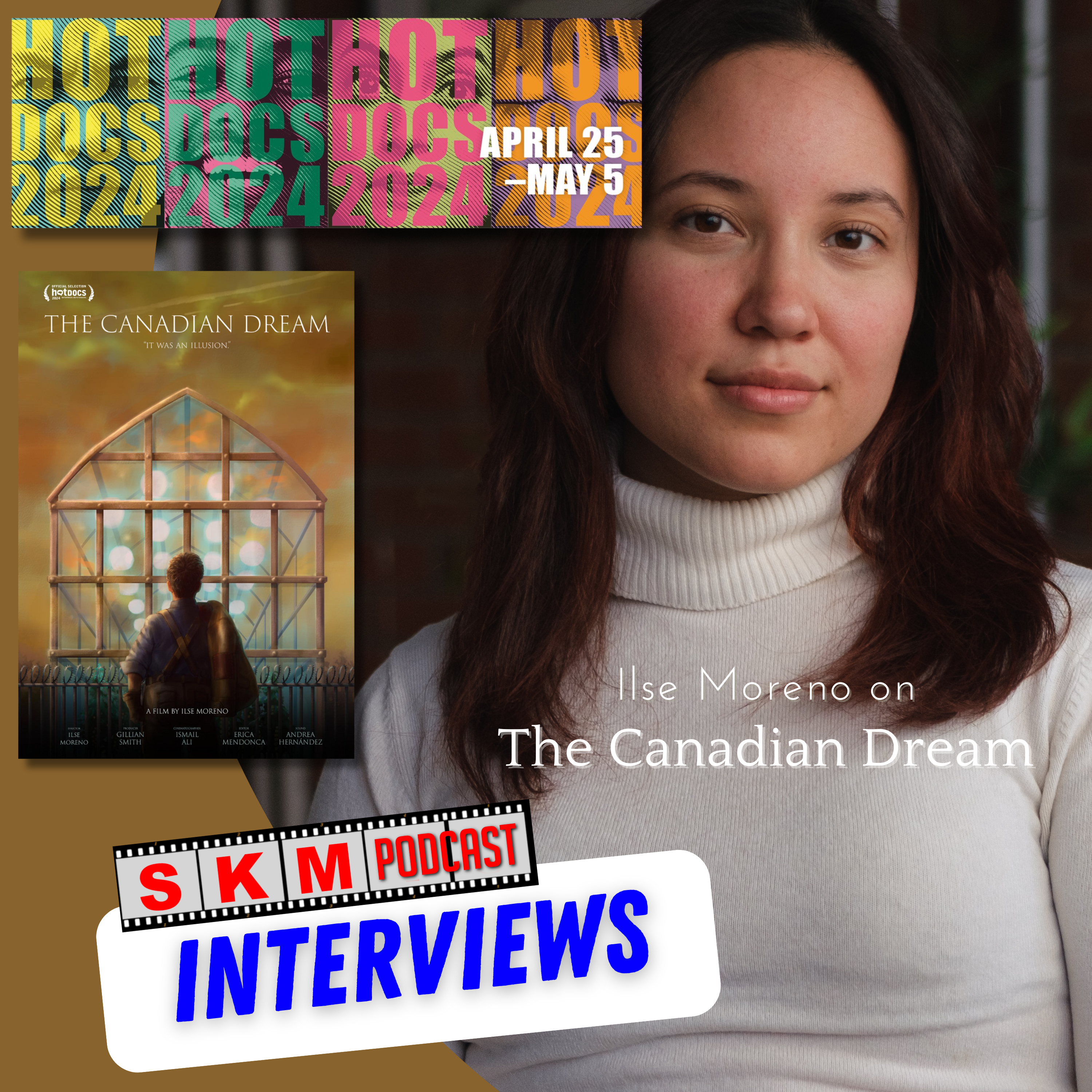Episode Transcript
[00:00:00] Speaker A: Hey there, listeners. If you're enjoying Sean Kelly interviews, why not take your experience to the next level? By signing up for our patreon at patreon sk on movies.com you'll unlock access to exclusive archival and unedited interviews. It's your chance to dive deeper into the conversations you love, hear behind the scenes stories and support the show while you're at it. So don't wait. Visit Patreon SK on Movies.com today and join our growing community of fans foreign.
[00:00:38] Speaker B: Hello and welcome to the Sean Kelly Interviews podcast. And today we have my interview with Lloyd Kaufman of Troma Entertainment about his latest film, hashtag Shakespeare Shitstorm, which is finally going to be available for streaming on Troma's Troma now streaming service on January 15, which is the date that this episode will be released. So this interview was recorded via Zoom in the summer of 2020 when Shakespeare Schif Storm played virtually as part of the Fantasia Film Festival. This is one of the favorite interviews that I have ever performed and. But I hope you enjoy the audio edit of the interview. And here is Lloyd Kaufman and his clarinet.
It looks like it's working.
[00:01:51] Speaker C: Hi, Sean. Oh, Sean.
[00:01:53] Speaker B: Hello.
[00:01:53] Speaker C: Well, are you filming this or just. Is it voice or what is.
[00:01:58] Speaker B: It's. It's both voice and video.
[00:02:18] Speaker C: You're welcome.
[00:02:19] Speaker B: Okay, thanks.
[00:02:20] Speaker C: I could go on, but I'm afraid you will quit.
[00:02:25] Speaker B: Okay.
[00:02:26] Speaker C: You don't see Martin Scorsese. You don't see Oliver Stone started with us, but you don't see him playing the clarinet.
He's sucking up the Putin. Right. He's sucking Putin's dick. Right. You know that he started. I discovered him second grade. Second grade. And he worked on. He's in my first movie that played in a movie theater.
[00:02:48] Speaker B: Okay, so that's some stardom. So what inspired you to make another Shakespeare based film like a quarter of a century after Tromeo and Juliet?
[00:02:59] Speaker C: It's a very good question.
The Tempest is my favorite Shakespeare play. It's druggie, it has magic, it's got a monster, it's got lovers. All the world loves a lover. I loved the rebel speech.
I learned it when I was in eighth grade in school. And my mother took me to see the Tempest when I was about nine years old. I saw it with Maurice Karunovsky and fabulous. And the fact I modeled my hair as much as I could, I had to make up. People try to duplicate.
There's a black and white 16 millimeter version of that particular tempest that was on TV, but I saw it in Stratford In Connecticut. Anyway, I wanted to wait till I was old and losing. It's all Prospero. The Tempest is all about losing power and losing your marbles a little bit. And it's got, you know, magic. He's a magician and movies are magic. And the monster, Caliban and the Tempest. And there's some room for some action. So I love the Tempest. I would have done it back instead of Tromeo and Juliet, but I wanted to feel what Prospero feels. The loss of one's faculties. You know, you can see in the play he's smart, but he's definitely getting weaker. And he's been kicked out of his own land, basically. I can relate to that because. Because the movie industry has gone from a almost. Well, I would say it's gone from an oligopoly to some kind of fascist.
I don't even want to elite. It's not even an oligopoly.
And whereas Troma could compete, the laws have all been changed so I no longer have my domain. It's the same as prosperous. Now I'm deep in the reeds of the underground. I'm in Tromaville. We're banished deep in the undergrounds. I mean, I've always been at Chornaville, but Prospero is banished to, you know, the island. But in, in our movie, he's banished it. He's sets up in Tromaville. He's had to flee. Same thing. Anyone wants revenge?
[00:05:23] Speaker B: Okay, so I was reading how the film is described as the most ambitious project in Trauma's history. So could you describe how that is?
[00:05:31] Speaker C: So sure. Well, it's a.
If you look at it, it has whales.
We have whales doing the thing in Flipper. I don't know if anybody got it. Not Flipper.
[00:05:45] Speaker B: Free Willy.
[00:05:46] Speaker C: Willy, yeah. Did you get that?
[00:05:48] Speaker B: Yeah. There's a line. Free Willy.
[00:05:50] Speaker C: Oh, I think I stuck that in post production because Free Willy, everybody who saw that is probably 100 years old.
And so we got that, we've got that boat. We've got a storm. That's terrific.
We've got lots of different locations.
Huge. We've got 2,000. The end credits are longer than the typical feature foot length movie. And it's all fan fueled. It's all fan fueled. So for half a million dollars, you're getting a 50 million dollar movie.
The special effects, there's the dick chicken. Right. You don't just go out and find that in 7 11. These things cost a lot of money. All those. There's a lot of.
Again, there's millions of dollars of practical effects. The guy, in fact, the guy from California who did most of the practical effects, he did some of the big Hollywood Iron man type stuff. But he also did Sharknado movies. And he's a huge Troma fan. So he created all these penises and weird things. And we collaborated on it, but he came up with a lot of that stuff. And then the other major special effects guy was Doug Sackman, who's worked for us for many, many years. He started with us when he was 16. But most of the people on the movie had worked for us or were fans. They came from England, from Iceland, From England, France, Canada, Montreal, Toronto, California, South America. It was the United Nations. The director of photography was from Los Angeles. The main cameraman was from Denmark. And they all came to make a movie in which they believed a movie and they knew it was. A lot of people said you couldn't do it.
To be honest, if you read that script, I think you probably at first glance would not think you could pull off all that stuff for half a million dollars. And I think it was less than half a million dollars. So, you know, it's a big deal. I mean, all our movies have. You know. In fact, Mitch mentioned to me it was great to see an independent. Mitch Davis, the best curator in the world, he mentioned to me. He said, wow, it's so great to see an independent film opening up and using all these people and things. And, you know, most of the independent genre films today, very small cast, one location, and they're great knocking them. Green Room was fabulous. And there's some wonderful films.
And that's why ours are rough around the edges, because we want them to be big. We want a lot of stuff going on. I have lots of people need to see my movies two or three times because. And it needs to be seen. I make them for the movie, for the big screen. Right, Sean? I make them for the big screen. There's all this stuff going on in the background that you can't really see on the small screen. And a lot of the lighting gets distorted when it gets smaller. But what the hell? If it wasn't for the small screen. Troma now, our streaming service has been going on for three years. And since we just got kicked off of our 300 free film YouTube channel, that's been up since the beginning of YouTube with 800,000 subscribers, has just been canceled, deleted by YouTube because of community standards. So, Troma now, if you fans want to help us, please subscribe to Troma Now. And the first month is free. First month is free if you want to see great movies.
[00:09:48] Speaker A: Quick. Aside for context, in August 2020, around the time this interview was conducted, Trauma was removed from YouTube due to a breach of community standards policies. However, I believe the issues with YouTube have since been resolved. Back to our interview.
[00:10:02] Speaker B: So that actually leads. My next question is, Adam, throughout the film, you kind of, like, speak out against social justice warriors who kind of, like, complain about anything and everything they deem offensive. So how does that relate to you and Trauma's experiences, such as the whole YouTube banning?
[00:10:21] Speaker C: Well, that just happened, so. But I saw it coming. That's why we created Amazon and YouTube. I've made a little documentary called Independent Artists vs Fascist Media Cartel. No, corrupt media cartel. Independent artists. You can see it on Troma now for free. The link is there for free. You don't even have to sign up.
And it lays out how YouTube and Amazon have double standards compared for the. They'll let all sorts of perversion from the majors and mainstream and from the people who don't compete with the mainstream. That's okay. But the companies that do compete with the mainstream, they go after. So part of it is that. But I went to Yale University, and Yale has become this place where it's not about an education. It's not about broadening your horizons. It's not about sophistication. It's not about debate.
When I went to school, I remember in my high school, my commie grandmother telling me the Vietnam War was wrong. So I went to seventh grade. I told my friends, you know, Vietnamese war. And here I gave reasons. And they, you know, they were, wow, that's. Wow, you really. I was the only one. But they didn't abuse me. Whereas at Yale, this.
The Yale University is now sending out letters to their students telling them what's acceptable to wear for Halloween. Don't wear a Mexican hat. That's why I put the Mexican hat in the movie. And I actually had in the opening.
What do you call it?
Protest. The opening protest where Brasgro is being. No, not where. Where the woman. Where his wife kills herself and the baby gets flattered.
There was an actual line from one of these Yale lynchings of a professor whose wife wrote a letter to Yale saying, I don't think that an open letter. I don't think that the Yale students, the smartest in the world, need to be told how to dress for Halloween. Yale said that Elmo. Where's Elmo is okay. And this video, you can go on, like, somehow somebody Sent it to me and I just got obsessed with it. And so that is a large part inspiration for. And then of course all the canceling that went on. We have one kind of a guy who was a Troma fan and was friendly with my brother and me. Al Franken from Saturday Night Libel became a senator. And my daughter Elizabeth worked for him for two years. She was his environmental speechwriter and researcher and said he was so devoted to being a public servant. And I have another friend who was a congressman for 30 years, he's a friend for 50 years and told me when he got out he was poor, but that he, as far as he knows, he's the only senator and congressman that has left the US Congress. Not a millionaire. You go in as, you know, whatever and you come out as a millionaire. And he didn't do that. So here's Al Franken, a real. One of the few public servants who really is trying to help us. They kick him out for a photograph from 25 years ago where he's doing, if I was in the Senate, I would be lynched. Holy fuck. And this poor professor who's a dean, he's a Nobel winning prize winner scientist, also a best selling author of at least one best selling book and a major, major superstar professor. And this mob comes to where he's living.
They call them colleges there, big buildings, no dormitories for students. And the dean is in charge of that particular dormitory. And they, this mob shows up and he comes out into the courtyard to talk to them like humans. And they just scream at him. No respect, not even that. I mean this is a man who's, you know, done something with his life. And these little shits are all, I just want a home. I don't want to do anything. I want, I don't want to be told. I don't want, I want, I want a wanna, wanna, want, you know. Oh my God, I couldn't believe it. And it's all over the country.
You know, there's no nuance, you can't, there's no, you're either, you know, it's like Trump. You're either with them or against them. And it's a pity, everybody is. And the big reason for that is the American educational system is way is kind of on a level with, I would guess Algeria maybe. You know, I don't, I know Canadian, you have good health care and good schools, but unless you're really rich here, you ain't gonna get a good education. Impossible. And even the rich people out in la, the people Are stupid. You know, you mentioned.
You mentioned Catcher in the Rye. They don't know what it is. You know, there's nothing you can talk about. You have to dumb everything down for them. And they're rich because the educational system is. So unless you're rich, you ain't going to get a good education. Nor teeth. Teeth, right? My teeth. I'm old. The teeth are thousands of dollars.
And you look at Americans now. Half of them have no teeth. Are they missing teeth? The other half, that's on opioids. Also missing teeth. I mean, really. And that's kind of what the whole Shakespeare shitstorm is about, right? The opioid, the big farmer. Big farmers shoving pills down our throats. From the time I got out of college, there are three generations of children who. Eating their obese, Making Fruit loops in the morning while they're watching those shit morning shows with their parents. With their parents who have no education. They're hearing about, oh, the pills. Yeah, you got to take a fart. Oh, there's a pill for that. You got a hangnail. Take a pill. So it's normalized, the taking of pills. And now what do you have? And if you can't get the pills anymore, then you go to opioids. So that was a big deal for me.
[00:16:51] Speaker B: So guess that's where the safe spatia came from.
[00:16:55] Speaker C: Exactly. That's right. We combined the two that. Good point. The safe space. My daughter, Lily Hayes Salzberg wrote and shot that commercial. And how true it is. Yes, Spaceship. That's right. It's about the big pharma and the social justice people.
[00:17:14] Speaker B: Okay, so there's a number of songs in the film. Who wrote them? And were there a plan to include more?
[00:17:21] Speaker C: No, those were. Shakespeare had songs in his movies, so I wrote the lyrics for all but one. And a guy came in to audition. We have a very, very long audition period. And a wonderful guy came in. Major Troma fan. Anna Lark. He's a librarian for the Morgan Museum. Morgan. Yeah. A museum in New York. Very good museum. And I think he's now moved on to something else. But he played mandolin. So when we auditioned for the first time, we tell people, do something. Doesn't matter. Do anything you want. You got three minutes. And we're going to film it. And then if you have some energy, we'll call you back and give you a specific part to read for. So this guy came in and he played the mandolin. And he played this tune on the mandolin. And the minute I heard it, I loved it. And he Couldn't act for shit. But I loved his music. And he probably could act for shit, But I don't think he was right for anything. And so I contacted him and said, hey, I'd like to use your music in the movie. I'm really lazy. Would you mind writing the lyrics? And he wrote the makes me wet lyrics, right. And Hit Storm was making me wet. And she was wonderful. And the way she sang it, I mean, wonderful. Kate McGarrigo, she's a natural comedienne. And so that song had nothing to do with. Although we did try to arrange. Add a better arrangement to it. It's not perfect, and it definitely. We didn't do his music justice. But the other songs, I wrote the lyrics.
And Philippe Melo in Portugal, a Portuguese guy, a big jazz guy in Portugal, wrote, Not only scored the film, he scored all the original music as his. And he and his little jazz group, he got a real orchestra to score the music for nothing, basically.
And he wrote the. He had an ensemble that wrote the kind of Frank Sinatra guy. Nelson Riddle arrangement for Ferdinand's song.
And then my song. Oh, no, my song was written by Count Smokulo. I didn't like that. Okay. Count Smokulo wrote it. I did like the lyrics. I changed the lyrics around it a bit. That's all. Yeah, he wrote it. And that was a hard one to sing. And because I had to talk, I had to stop the song talk and then go back into sync. And that was not so easy. But Count Smokila, who is not in the film, but he's in a lot of our movies. Great guy. And he has written. He wrote a poltergeist theme song. Not the one at the. Yeah, he wrote the poltergeist theme song. Yeah. Great guy. John Smokiler.
Robert Miles. Robert Miles. His real name is Robert Miles. Sorry, I just joined.
[00:20:32] Speaker B: Okay, so what can we expect from Troma's future?
[00:20:39] Speaker C: Well, I'm happy to say Mutant Blast by one of my proteges, Fernando Ale is terrific. And it played in about 35 very good festivals.
[00:20:50] Speaker B: Yeah. Played in Toronto last year for Toronto for the Dark.
[00:20:53] Speaker C: Oh, good, good.
And then it played in California at Laemmle Cinemas and did very well. But then the day, the second week, Covid was declared and the director had to go back to Portugal and I and others had to go back to New York, go into lockdown. And so it was booked in some other theaters, but everything's been canceled. But Mutant Blast can be rented and bought on Troma now. Watch.troma.com, if you want to go, you can see watch.trauma.com for free first month. And then it's only $4.99 for the rest of the time. And since we have been kicked off YouTube, it would be great if our fans could go there and try to help us out. And it's great. I mean, go look at the comments. They're all positive. I, I don't know. I don't curate Stroman. We have people who do that. And I see films there that I'm thinking, oh, it's pretty cerebral. And the fans, they really enjoy the channel and I enjoy it. It's a discovery. It's real art. It comes from the heart. It's not committee made. It's not, oh, let's make a documentary about Frank Sinatra. I mean, it's a great documentary but you know, you got a committee doing it. It's not art. It's interesting, but it's, you know, it's not Robert Flaherty, that's for sure.
So the point is, we have new movies coming out. I don't know if I mentioned it. Did I mention Divide and Conquer by Mercedes, the muse? She had to stop shooting because of. I told her to stop shooting, but she'll recompete hopefully in October, you know, if it's safe. And then Heidi Moore finished the sequel to her Deadly Dolly which runs on Troma now. It's called Divide and Conquer. Very likely. First, even more feminist and has some themes that wrote into the script. And then there's Liam Regan who worked on Return to Newcomb High and Return to Return to Newcomb High. He lives in Sheffield, England. And he came to Iceland? No, he came to Albania where we shot on his own dime. On his own.
Dublin. On his own. What do you call your thing? Looney. He came to Albania, paid his way and the guy from Iceland did too. And Liam worked on the movie in Iceland and then he came to New York to work on the crew and his movie. I'm in his first movie. My.
My bloody Banjo. My bloody Banjo. Also on Troma now. And when I did the two day masterclass at Oxford, YouTube says that community standards mean we don't have the right to be seen. Oxford had me out three years ago for two day masterclass and he took a bus from Sheffield eight hours to see my master class. And so I gave him some money to make this eating Mrs. Campbell his next film. And it's very good. It's in being edited. He got it just finished principal photography. May have to do touch up after Covid.
The films that we're making, I don't want them filming because I don't want to. Our three rules of production are safety to humans. You know, then safety to people's property and make a good movie. But safety to humans is much bigger on all the posters that are slapped.
[00:24:37] Speaker B: I think time's up, so I think gotta let you go.
[00:24:40] Speaker C: Lucky for you. Lucky. Thank you very much.
[00:24:45] Speaker A: Sean Kelly on Movies Interviews is part of the SK on Movies podcast network. You can access links to all our shows by going to skonmoviespodcast, ca or search us on Spotify, Apple Podcasts, YouTube, or where else you listen to your podcasts. This has been a production of Sean Kelly on Movies.
 Get ready to be shocked by what Lloyd Kaufman has to say about the new Troma film #ShakespearesShitstorm in this exclusive interview recorded virtually during the 2020 Fantasia Film Festival! Tune in to hear all the juicy details about his latest release, streaming on January 15, 2025 on Troma Now. Bumpers and Aside A.I. Voiceover created using ElevenLabs. Bumper Music “Hero In Peril” by AudionautixLicensed under a Creative Commons Attribution 4.0 license.Artist: Audionautix News Theme by Kevin MacLeod is licensed under a Creative Commons Attribution 4.0 license. https://creativecommons.org/licenses/by/4.0/ Artist: http://incompetech.com/
Get ready to be shocked by what Lloyd Kaufman has to say about the new Troma film #ShakespearesShitstorm in this exclusive interview recorded virtually during the 2020 Fantasia Film Festival! Tune in to hear all the juicy details about his latest release, streaming on January 15, 2025 on Troma Now. Bumpers and Aside A.I. Voiceover created using ElevenLabs. Bumper Music “Hero In Peril” by AudionautixLicensed under a Creative Commons Attribution 4.0 license.Artist: Audionautix News Theme by Kevin MacLeod is licensed under a Creative Commons Attribution 4.0 license. https://creativecommons.org/licenses/by/4.0/ Artist: http://incompetech.com/


